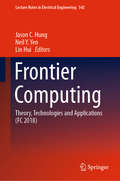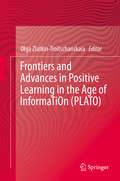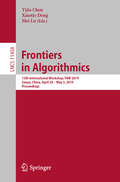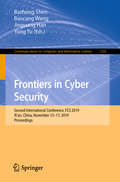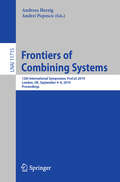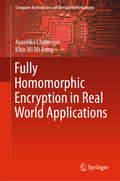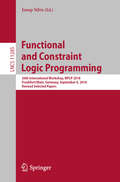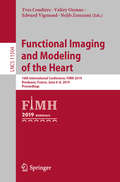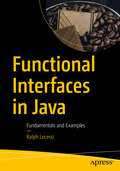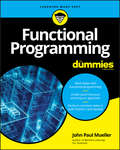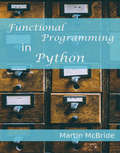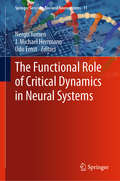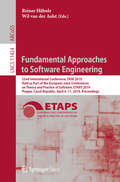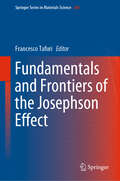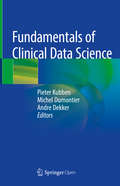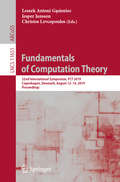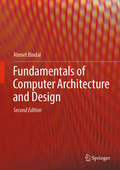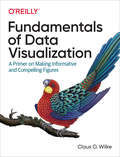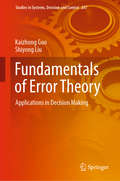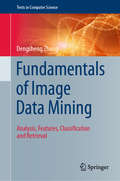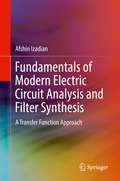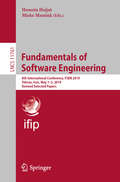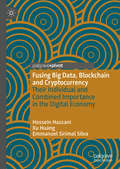- Table View
- List View
Frontier Computing: Theory, Technologies and Applications (FC 2018) (Lecture Notes in Electrical Engineering #542)
by Jason C. Hung Neil Y. Yen Lin HuiThis book presents the proceedings of the 6th International Conference on Frontier Computing, held in Kuala Lumpur, Malaysia on July 3–6, 2018, and provides comprehensive coverage of the latest advances and trends in information technology, science and engineering. It addresses a number of broad themes, including communication networks, business intelligence and knowledge management, web intelligence, and related fields that inspire the development of information technology. The contributions cover a wide range of topics: database and data mining, networking and communications, web and internet of things, embedded systems, soft computing, social network analysis, security and privacy, optical communication, and ubiquitous/pervasive computing. Many of the papers outline promising future research directions. The book is a valuable resource for students, researchers and professionals, and also offers a useful reference guide for newcomers to the field.
Frontiers and Advances in Positive Learning in the Age of InformaTiOn (PLATO)
by Olga Zlatkin-TroitschanskaiaResearch on students’ media use outside of education is just slowly taking off. Influences of information and communication technologies (ICT) on human information processing are widely assumed and particularly effects of dis- and misinformation are a current threat to democracies. Today, higher education competes with a very diverse (online) media landscape and domain-specific content from sources of varying quality, ranging from high-quality videographed lectures by top-level university lecturers, popular-scientific video talks, collaborative wikis, anonymous forum comments or blog posts to YouTube remixes of discipline factoids and unverified twitter feeds. Self-organizing learners need more knowledge, skills, and awareness on how to critically evaluate quality and select trustworthy sources, how to process information, and what cognitive, affective, attitudinal, behavioral, and neurological effects it can have on them in the long term. The PLATO program takes on the ambitious goal of uniting strands of research from various disciplines to address these questions through fundamental analyses of human information processing when learning with the Internet. This innovative interdisciplinary approach includes elements of ICT innovations and risks, learning analytics and large-scale computational modelling aimed to provide us with a better understanding of how to effectively and autonomously acquire reliable knowledge in the Information Age, how to design ICTs, and shape social and human-machine interactions for successful learning. This volume will be of interest to researchers in the fields of educational sciences, educational measurement and applied branches of the involved disciplines, including linguistics, mathematics, media studies, sociology of knowledge, philosophy of mind, business, ethics, and educational technology.
Frontiers in Algorithmics: 13th International Workshop, FAW 2019, Sanya, China, April 29 – May 3, 2019, Proceedings (Lecture Notes in Computer Science #11458)
by Yijia Chen Xiaotie Deng Mei LuThis book constitutes the proceedings of the 13th International Workshop on Frontiers in Algorithmics, FAW 2019, held in Sanya, China, in April/May 2019. The 15 full papers presented in this volume were carefully reviewed and selected from 21 submissions. The workshop provides a focused forum on current trends of research on algorithms, discrete structures, and their applications, and brings together international experts at the research frontiers in these areas to exchange ideas and to present significant new results.
Frontiers in Algorithmics: 13th International Workshop, FAW 2019, Sanya, China, April 29 – May 3, 2019, Proceedings (Lecture Notes in Computer Science #11458)
by Yijia Chen Xiaotie Deng Mei LuThis book constitutes the proceedings of the 13th International Workshop on Frontiers in Algorithmics, FAW 2019, held in Sanya, China, in April/May 2019. The 15 full papers presented in this volume were carefully reviewed and selected from 21 submissions. The workshop provides a focused forum on current trends of research on algorithms, discrete structures, and their applications, and brings together international experts at the research frontiers in these areas to exchange ideas and to present significant new results.
Frontiers in Cyber Security: Second International Conference, FCS 2019, Xi'an, China, November 15–17, 2019, Proceedings (Communications in Computer and Information Science #1105)
by Bazhong Shen Baocang Wang Jinguang Han Yong YuThis book constitutes the proceedings of the Second International Conference on Frontiers in Cyber Security, FCS 2019, held in Xi'an, China, in November 2019. The 20 full papers along with the 2 short papers presented were carefully reviewed and selected from 67 submissions. The papers are organized in topical sections on: symmetric key cryptography; public key cryptography; post-quantum cryptography: signature; attack and behavior detection; authenticated key agreement; blockchain; system and network security.
Frontiers of Combining Systems: 12th International Symposium, FroCoS 2019, London, UK, September 4-6, 2019, Proceedings (Lecture Notes in Computer Science #11715)
by Andreas Herzig Andrei PopescuThis book constitutes the proceedings of the 12th International Symposium on Frontiers of Combining Systems, FroCoS 2019, held in London, UK, in September 2019, colocated with the 28th International Conference on Automated Reasoning with Analytic Tableaux and Related Methods, TABLEAUX 2019. The 20 papers presented were carefully reviewed and selected from 30 submissions. They present research on the development of techniques and methods for the combination and integration of formal systems, their modularization and analysis. The papers are organized in the following topical sections: automated theorem proving and model building, combinations of systems, constraint solving, description logics, interactive theorem proving, modal and epistemic logics, and rewriting and unification.
Fugly
by Claire WallerA wrenchingly honest, thought-provoking exploration of a girl judged and dismissed by society who must break the cycle of shaming that traps her in her real life and comforts her in her online one. In real life, eighteen-year-old Beth is overweight, shy, and geeky. She's been bullied all her life, and her only refuge is food. Online, though, she's a vicious troll who targets the beautiful, vain, oversharing It Girls of the internet. When she meets Tori, a fellow troll, she becomes her online girlfriend-slash-partner-in-crime. But then Tori picks a target who's a little too close to home for Beth. Unsettled, Beth decides to quit their online bullying partnership. The only problem is, Tori is not willing to let her go.
Fully Homomorphic Encryption in Real World Applications (Computer Architecture and Design Methodologies)
by Ayantika Chatterjee Khin Mi AungThis book explores the latest developments in fully homomorphic encryption (FHE), an effective means of performing arbitrary operations on encrypted data before storing it in the ‘cloud’. The book begins by addressing perennial problems like sorting and searching through FHE data, followed by a detailed discussion of the basic components of any algorithm and adapting them to handle FHE data. In turn, the book focuses on algorithms in both non-recursive and recursive versions and discusses their realizations and challenges while operating in the FHE domain on existing unencrypted processors. It highlights potential complications and proposes solutions for encrypted database design with complex queries, including the basic design details of an encrypted processor architecture to support FHE operations in real-world applications.
Functional and Constraint Logic Programming: 26th International Workshop, WFLP 2018, Frankfurt/Main, Germany, September 6, 2018, Revised Selected Papers (Lecture Notes in Computer Science #11285)
by Josep SilvaThis book constitutes the refereed post-conference proceedings of the 26th International Workshop on Functional and Constraint Logic Programming, WFLP 2018, held in Frankfurt/Main, Germany, in September 2018. From the 19 full papers submitted,12 were accepted for presentation at the workshop. During a second review after the workshop, 10 papers were accepted for inclusion in this volume. The papers cover different programming areas of functional and logic programming, including code generation, verification, and debugging. They are organized in the following topical sections: compilers and code generation; debugging and testing; and foundations of functional logic programming.
Functional Imaging and Modeling of the Heart: 10th International Conference, FIMH 2019, Bordeaux, France, June 6–8, 2019, Proceedings (Lecture Notes in Computer Science #11504)
by Yves Coudière Valéry Ozenne Edward Vigmond Nejib ZemzemiThis book constitutes the refereed proceedings of the 10th International Conference on Functional Imaging and Modeling of the Heart, held in Bordeaux, France, in June 2019.The 46 revised full papers were carefully reviewed and selected from 50 submissions. The focus of the papers is on following topics: Electrophysiology: mapping and biophysical modelling; Novel imaging tools and analysis methods for myocardial tissue characterization and remodeling; Biomechanics: modeling and tissue property measurements; Advanced cardiac image analysis tools for diagnostic and interventions.
Functional Interfaces in Java: Fundamentals and Examples
by Ralph LecessiReduce development time by organizing your programs as chains of functional interfaces and see that the advantages of using functional interfaces include the flexibility and power of inlined functional chains and reuse of functional methods utilized throughout the Java API. You’ll see how complex logical expressions can be reduced to chains of predicates and how chains of comparators can be used to sort data by several criteria in order. Other examples include streams that utilize functional interfaces to filter, sort, transform, and perform calculations on data; CompletableFutures that use functional interfaces to create cascading and parallel execution threads; and JavaFX programs that use functional interfaces to monitor the data backed by their graphical components.Each chapter contains a complete programming project: the Discount Dave project shows you how to qualify car customers by organizing questions as a list of predicates; the Real Estate Broker project shows you how to use chains of comparators to filter and sort homes according to customer priorities; the Dave's Part Inventory project shows you how to query and write reports from an inventory database using stream operations; and the Sentence Builder project shows you how to correct a sentence by implementing each grammar rule as a separate link in a future chain.Functional Interfaces in Java will help you quickly develop powerful and reliable programs that utilize functional interfaces to implement logic and calculations.What You Will LearnUse the functional interfaces in the java.util.function package to perform conditional logic, transform and generate data, and perform calculationsFilter and sort data by several criteria using comparators Process collections and filter, sort, transform, and reduce stream elements with functional interfaces Write cascading and parallel execution threadsWho This Book Is ForComputer science student or a professional Java programmer. This work is a rigorous discussion of the application of functional interfaces, so prerequisites for this text include basic Java programming and object-oriented Java programming.
Functional Programming For Dummies
by John Paul MuellerYour guide to the functional programming paradigm Functional programming mainly sees use in math computations, including those used in Artificial Intelligence and gaming. This programming paradigm makes algorithms used for math calculations easier to understand and provides a concise method of coding algorithms by people who aren't developers. Current books on the market have a significant learning curve because they're written for developers, by developers—until now. Functional Programming for Dummies explores the differences between the pure (as represented by the Haskell language) and impure (as represented by the Python language) approaches to functional programming for readers just like you. The pure approach is best suited to researchers who have no desire to create production code but do need to test algorithms fully and demonstrate their usefulness to peers. The impure approach is best suited to production environments because it's possible to mix coding paradigms in a single application to produce a result more quickly. Functional Programming For Dummies uses this two-pronged approach to give you an all-in-one approach to a coding methodology that can otherwise be hard to grasp. Learn pure and impure when it comes to coding Dive into the processes that most functional programmers use to derive, analyze and prove the worth of algorithms Benefit from examples that are provided in both Python and Haskell Glean the expertise of an expert author who has written some of the market-leading programming books to date If you’re ready to massage data to understand how things work in new ways, you’ve come to the right place!
Functional Programming in Python: Explore what functional programming is, how it is used, and the features of Python that support it
by Martin McBrideLearn functional programming concepts and techniques to build Python applications Key Features Study in detail all aspects of functional programming, including immutability, generators, and more Reinforce your learning through elaborate examples Learn how to implement advanced topics like closures, memoization, and monads in your applications Book Description Python supports four programming paradigms – imperative, procedural, object-oriented, and functional. Of these, functional programming is probably the least understood and the least used. This book covers several topics that are directly and indirectly related to functional programming. After a quick overview of functional programming and its characteristics, Functional Programming in Python explains the various concepts of Python, starting with functions. You'll learn how to change the value of an object by using mutability. You'll then look at recursion as a more functional alternative to looping for certain algorithms, and learn how memoization alleviates the limitations of recursion in certain situations. The book further explains how to use closures as function factories and how to handle errors and exceptions with functors and monads. By the end of this book, you'll have all the knowledge you need for developing your applications with functional programming in Python. What you will learn Understand the advantages and disadvantages of functional programming Use closures in your code to dynamically create functions Create your own iterators Use the general-purpose functools to create your own specialized reducing functions Study and implement list and generator comprehensions to create lists Create customized iterators with generators Who this book is for If you are a developer looking to create applications in Python using functional programming, this book is ideal for you. You will only need a basic knowledge of Python. Prior knowledge or experience of functional programming is not required.
The Functional Role of Critical Dynamics in Neural Systems (Springer Series on Bio- and Neurosystems #11)
by Nergis Tomen J. Michael Herrmann Udo ErnstThis book offers a timely overview of theories and methods developed by an authoritative group of researchers to understand the link between criticality and brain functioning. Cortical information processing in particular and brain function in general rely heavily on the collective dynamics of neurons and networks distributed over many brain areas. A key concept for characterizing and understanding brain dynamics is the idea that networks operate near a critical state, which offers several potential benefits for computation and information processing. However, there is still a large gap between research on criticality and understanding brain function. For example, cortical networks are not homogeneous but highly structured, they are not in a state of spontaneous activation but strongly driven by changing external stimuli, and they process information with respect to behavioral goals. So far the questions relating to how critical dynamics may support computation in this complex setting, and whether they can outperform other information processing schemes remain open. Based on the workshop “Dynamical Network States, Criticality and Cortical Function", held in March 2017 at the Hanse Institute for Advanced Studies (HWK) in Delmenhorst, Germany, the book provides readers with extensive information on these topics, as well as tools and ideas to answer the above-mentioned questions. It is meant for physicists, computational and systems neuroscientists, and biologists.
Fundamental Approaches to Software Engineering: 22nd International Conference, FASE 2019, Held as Part of the European Joint Conferences on Theory and Practice of Software, ETAPS 2019, Prague, Czech Republic, April 6–11, 2019, Proceedings (Lecture Notes in Computer Science #11424)
by Reiner Hähnle Wil van der AalstThis book is Open Access under a CC BY licence.This book constitutes the proceedings of the 22nd International Conference on Fundamental Approaches to Software Engineering, FASE 2019, which took place in Prague, Czech Republic in April 2019, held as Part of the European Joint Conferences on Theory and Practice of Software, ETAPS 2019.The 24 papers presented in this volume were carefully reviewed and selected from 94 submissions. The papers are organized in topical sections named: software verification; model-driven development and model transformation; software evolution and requirements engineering; specification, design, and implementation of particular classes of systems; and software testing.
Fundamentals and Frontiers of the Josephson Effect (Springer Series in Materials Science #286)
by Francesco TafuriThis book provides a comprehensive and up-to-date description of the Josephson effect, a topic of never-ending interest in both fundamental and applied physics. In this volume, world-renowned experts present the unique aspects of the physics of the Josephson effect, resulting from the use of new materials, of hybrid architectures and from the possibility of realizing nanoscale junctions. These new experimental capabilities lead to systems where novel coherent phenomena and transport processes emerge. All this is of great relevance and impact, especially when combined with the didactic approach of the book. The reader will benefit from a general and modern view of coherent phenomena in weakly-coupled superconductors on a macroscopic scale. Topics that have been only recently discussed in specialized papers and in short reviews are described here for the first time and organized in a general framework. An important section of the book is also devoted to applications, with focus on long-term, future applications. In addition to a significant number of illustrations, the book includes numerous tables for comparative studies on technical aspects.
Fundamentals of Clinical Data Science
by Pieter Kubben Michel Dumontier Andre DekkerThis open access book comprehensively covers the fundamentals of clinical data science, focusing on data collection, modelling and clinical applications. Topics covered in the first section on data collection include: data sources, data at scale (big data), data stewardship (FAIR data) and related privacy concerns. Aspects of predictive modelling using techniques such as classification, regression or clustering, and prediction model validation will be covered in the second section. The third section covers aspects of (mobile) clinical decision support systems, operational excellence and value-based healthcare. Fundamentals of Clinical Data Science is an essential resource for healthcare professionals and IT consultants intending to develop and refine their skills in personalized medicine, using solutions based on large datasets from electronic health records or telemonitoring programmes. The book’s promise is “no math, no code”and will explain the topics in a style that is optimized for a healthcare audience.
Fundamentals of Computation Theory: 22nd International Symposium, FCT 2019, Copenhagen, Denmark, August 12-14, 2019, Proceedings (Lecture Notes in Computer Science #11651)
by Leszek Antoni Gąsieniec Jesper Jansson Christos LevcopoulosThis book constitutes the proceedings of the 22nd International Symposium on Fundamentals of Computation Theory, FCT 2019, held in Copenhagen, Denmark, in August 2019.The 21 full papers included in this volume were carefully reviewed and selected from 45 submissions. In addition, the book contains 3 invited talks in full-paper length. The papers were organized in topical sections named: formal methods, complexity, and algorithms.
Fundamentals of Computer Architecture and Design
by Ahmet BindalThis textbook provides semester-length coverage of computer architecture and design, providing a strong foundation for students to understand modern computer system architecture and to apply these insights and principles to future computer designs. It is based on the author’s decades of industrial experience with computer architecture and design, as well as with teaching students focused on pursuing careers in computer engineering. Unlike a number of existing textbooks for this course, this one focuses not only on CPU architecture, but also covers in great detail in system buses, peripherals and memories. This book teaches every element in a computing system in two steps. First, it introduces the functionality of each topic (and subtopics) and then goes into “from-scratch design” of a particular digital block from its architectural specifications using timing diagrams. The author describes how the data-path of a certain digital block is generated using timing diagrams, a method which most textbooks do not cover, but is valuable in actual practice. In the end, the user is ready to use both the design methodology and the basic computing building blocks presented in the book to be able to produce industrial-strength designs.
Fundamentals of Data Visualization: A Primer on Making Informative and Compelling Figures
by Claus O. WilkeEffective visualization is the best way to communicate information from the increasingly large and complex datasets in the natural and social sciences. But with the increasing power of visualization software today, scientists, engineers, and business analysts often have to navigate a bewildering array of visualization choices and options.This practical book takes you through many commonly encountered visualization problems, and it provides guidelines on how to turn large datasets into clear and compelling figures. What visualization type is best for the story you want to tell? How do you make informative figures that are visually pleasing? Author Claus O. Wilke teaches you the elements most critical to successful data visualization.Explore the basic concepts of color as a tool to highlight, distinguish, or represent a valueUnderstand the importance of redundant coding to ensure you provide key information in multiple waysUse the book’s visualizations directory, a graphical guide to commonly used types of data visualizationsGet extensive examples of good and bad figures; learn how to use figures in a document or report
Fundamentals of Error Theory: Applications in Decision Making (Studies in Systems, Decision and Control #267)
by Kaizhong Guo Shiyong LiuThis book provides a tool for generic readers and graduates who are interested or majoring in systems engineering, decision science, management science, and project management to sharpen their system thinking skills, equipping them with a multiangle perspective, and offering them broader view to understand the complex socioeconomic system in which we are embedded. It systematically investigates the root causes and mechanisms that generate errors through the use of fuzzy set theory, systems science, logic and set theory, and decision science – an area that has rarely been explored in literature. The topics covered include classic error set, fuzzy error set, multivariate error set, error function, identification of errors, error systems, error logic, error matrix, and practical application of error theory in a sewage project.
Fundamentals of Image Data Mining: Analysis, Features, Classification and Retrieval (Texts in Computer Science)
by Dengsheng ZhangThis reader-friendly textbook presents a comprehensive review of the essentials of image data mining, and the latest cutting-edge techniques used in the field. The coverage spans all aspects of image analysis and understanding, offering deep insights into areas of feature extraction, machine learning, and image retrieval. The theoretical coverage is supported by practical mathematical models and algorithms, utilizing data from real-world examples and experiments.Topics and features: describes the essential tools for image mining, covering Fourier transforms, Gabor filters, and contemporary wavelet transforms; reviews a varied range of state-of-the-art models, algorithms, and procedures for image mining; emphasizes how to deal with real image data for practical image mining; highlights how such features as color, texture, and shape can be mined or extracted from images for image representation; presents four powerful approaches for classifying image data, namely, Bayesian classification, Support Vector Machines, Neural Networks, and Decision Trees; discusses techniques for indexing, image ranking, and image presentation, along with image database visualization methods; provides self-test exercises with instructions or Matlab code, as well as review summaries at the end of each chapter.This easy-to-follow work illuminates how concepts from fundamental and advanced mathematics can be applied to solve a broad range of image data mining problems encountered by students and researchers of computer science. Students of mathematics and other scientific disciplines will also benefit from the applications and solutions described in the text, together with the hands-on exercises that enable the reader to gain first-hand experience of computing.
Fundamentals of Modern Electric Circuit Analysis and Filter Synthesis: A Transfer Function Approach
by Afshin IzadianThis textbook explains the fundamentals of electric circuits and uses the transfer function as a tool to analyze circuits, systems, and filters. The author avoids the Fourier transform and three phase circuits, since these topics are often not taught in circuits courses. General transfer functions for low pass, high pass, band pass and band reject filters are demonstrated, with first order and higher order filters explained in plain language. The author’s presentation is designed to be accessible to a broad audience, with the concepts of circuit analysis explained in basic language, reinforced by numerous, solved examples.
Fundamentals of Software Engineering: 8th International Conference, FSEN 2019, Tehran, Iran, May 1-3, 2019, Revised Selected Papers (Lecture Notes in Computer Science #11761)
by Mieke Massink Hossein HojjatThis book constitutes the thoroughly refereed post-conference proceedings of the 8th International Conference on Fundamentals of Software Engineering, FSEN 2019, held in Tehran, Iran, in May 2019.The 14 full papers and 3 short papers presented in this volume were carefully reviewed and selected from 47 submissions. The topics of interest in FSEN span over all aspects of formal methods, especially those related to advancing the application of formal methods in the software industry and promoting their integration with practical engineering techniques. The papers are organized in topical sections on agent based systems, theorem proving, learning, verification, distributed algorithms, and program analysis.
Fusing Big Data, Blockchain and Cryptocurrency: Their Individual and Combined Importance in the Digital Economy
by Hossein Hassani Xu Huang Emmanuel Sirimal SilvaAs technology continues to revolutionise today’s economy, Big Data, Blockchain and Cryptocurrency are rapidly transforming themselves into mainstream functions within the financial services industry. This book examines each concept individually, analysing the opportunities and challenges they bring and exploring the potential for future development. The authors further evaluate the fusion of these three important products of the FinTech revolution, illustrating their combined influence on the digital economy. Providing a comprehensive analysis of three innovative technologies, this timely book will appeal to scholars researching innovation in the finance industry and financial services technology more specifically.
